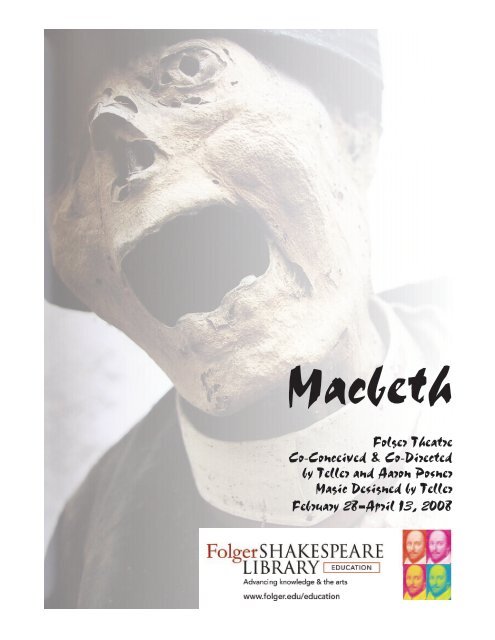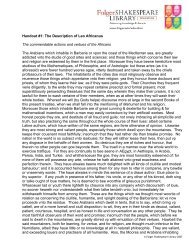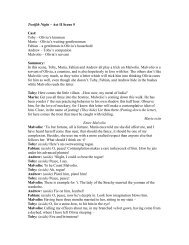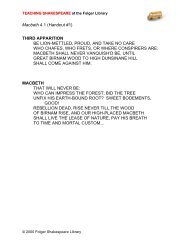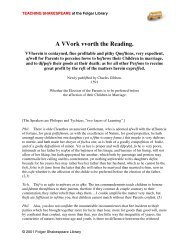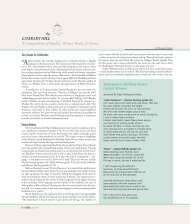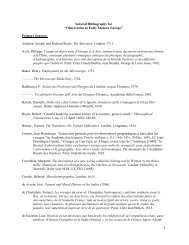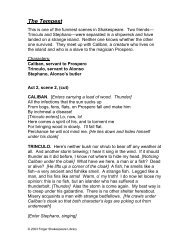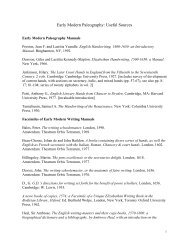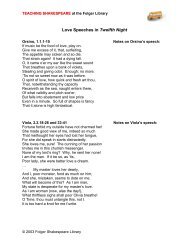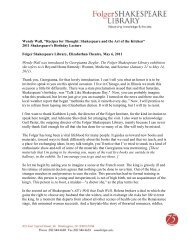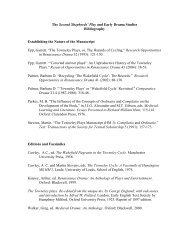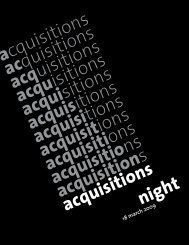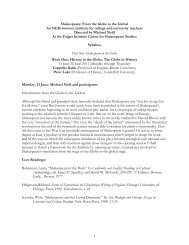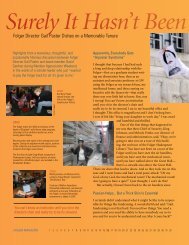Macbeth Study Guide - Folger Shakespeare Library
Macbeth Study Guide - Folger Shakespeare Library
Macbeth Study Guide - Folger Shakespeare Library
Create successful ePaper yourself
Turn your PDF publications into a flip-book with our unique Google optimized e-Paper software.
<strong>Macbeth</strong><br />
<strong>Folger</strong> Theatre<br />
Co-Conceived & Co-Directed<br />
by Teller and Aaron Posner<br />
Magic Designed by Teller<br />
February 28-April 13, 2008
Synopsis<br />
<strong>Macbeth</strong>, Thane of Glamis, has just<br />
bravely defeated a rebel faction led<br />
by the Thane of Cawdor. Receiving<br />
news of <strong>Macbeth</strong>’s heroic feats<br />
from a wounded soldier, Duncan,<br />
King of Scotland, immediately<br />
sentences the Thane of Cawdor to<br />
death and confers that title upon <strong>Macbeth</strong>. Unaware<br />
of the King’s actions, <strong>Macbeth</strong> and his fellow soldier,<br />
Banquo, withdrawing from the battlefield, encounter<br />
three weird sisters. The mysterious creatures predict<br />
that <strong>Macbeth</strong> will become both Thane of Cawdor and<br />
King of Scotland and that Banquo’s children will be<br />
kings. Before <strong>Macbeth</strong> and Banquo can question the<br />
sisters further, they vanish. Scottish lords then arrive<br />
to inform <strong>Macbeth</strong> of his new title, thus confirming the<br />
weird sisters’ prophecy. Soon after, Duncan proclaims<br />
his son, Malcolm, heir to the throne of Scotland and<br />
announces his intention to visit <strong>Macbeth</strong>’s castle at<br />
Inverness. <strong>Macbeth</strong> sends word to his wife about his<br />
new title and his encounter with the weird sisters.<br />
At Inverness castle, Lady <strong>Macbeth</strong> reads a<br />
letter from <strong>Macbeth</strong> describing how the weird sisters<br />
predicted his new title. She calls upon spirits to<br />
empower her and ensure that <strong>Macbeth</strong> ascends the<br />
throne -- at any cost. The news that King Duncan<br />
plans to stay the night at their castle strengthens her<br />
resolve to murder him and clear the way for <strong>Macbeth</strong><br />
to become King. <strong>Macbeth</strong> seems to agree to her plan<br />
initially, but as the evening progresses, he seems<br />
more reluctant to proceed with the murder. Sensing<br />
his hesitation, Lady <strong>Macbeth</strong> deliberately questions<br />
her husband’s manhood and courage, and in doing<br />
so convinces <strong>Macbeth</strong> to go through with the bloody<br />
deed. She explains to him the strategy she has devised<br />
to frame the King’s guards for the murder.<br />
Macduff, Thane of Fife, arrives at Inverness<br />
early the next morning to wake King Duncan. After<br />
being let in by a drunken Porter, Macduff discovers<br />
the body of the murdered King. In the ensuing<br />
chaos, the King’s sons, Malcolm and Donalbain flee.<br />
Suspicion falls upon them for the murder. <strong>Macbeth</strong> is<br />
therefore the successor to the throne. Once he is king,<br />
<strong>Macbeth</strong> becomes obsessed with the prophecy that<br />
Banquo’s children will succeed him, so he dispatches<br />
murderers to kill Banquo and his son, Fleance. The<br />
father and son are ambushed and Banquo is killed,<br />
but Fleance manages to escape unharmed. That<br />
night, <strong>Macbeth</strong> holds a banquet, and during the feast<br />
the ghost of Banquo appears before the new King<br />
<strong>Macbeth</strong>. This disturbing vision forces <strong>Macbeth</strong> to act<br />
strangely in front of his guests, and so Lady <strong>Macbeth</strong><br />
urges them to leave quickly.<br />
Desperate for more knowledge of the future,<br />
<strong>Macbeth</strong> seeks out the weird sisters again. They<br />
summon three spirits. The first tells <strong>Macbeth</strong> to<br />
beware of Macduff. The second assures him that<br />
“none of woman born” can harm him, and the third<br />
predicts that <strong>Macbeth</strong> will never be defeated until<br />
Birnam Wood comes to his castle at Dunsinane. The<br />
weird sisters then show <strong>Macbeth</strong> a line of eight kings,<br />
descended from Banquo, who will succeed him.<br />
Realizing that <strong>Macbeth</strong>’s rule has become<br />
a reign of terror, Macduff flees to England to raise<br />
an army against him. Learning of this, <strong>Macbeth</strong><br />
sends murderers to Macduff’s castle to slay his wife,<br />
children and all members of his household. Tortured<br />
with guilt, Lady <strong>Macbeth</strong> sleepwalks, reliving the<br />
night of Duncan’s murder and revealing the foul deed<br />
to a doctor and gentlewoman.<br />
Accompanied by Macduff and an army from<br />
England, Duncan’s son, Malcolm, returns to win back<br />
his father’s kingdom. The soldiers break off branches<br />
from trees in Birnam Wood to use as camouflage as<br />
they march towards Dunsinane. <strong>Macbeth</strong> learns from<br />
a servant that his wife is dead. A messenger tells him<br />
that many of his followers are deserting him and that<br />
“the wood began to move.” Confident that he cannot<br />
be harmed by anyone born of woman, <strong>Macbeth</strong> arms<br />
himself and confronts<br />
the approaching army.<br />
Macduff reveals that<br />
he was not born,<br />
but “untimeyly<br />
ripped” from his<br />
mother’s womb. He<br />
kills <strong>Macbeth</strong> and<br />
pronounces Malcolm<br />
as the new King of<br />
Scotland.<br />
The opening page of<br />
<strong>Macbeth</strong> in the First Folio<br />
edition of <strong>Shakespeare</strong>’s<br />
plays, 1623.
Who's Who in<br />
The Royal Family<br />
Teller and Aaron<br />
Posner’s adaptation<br />
of <strong>Shakespeare</strong>’s<br />
<strong>Macbeth</strong><br />
Malcolm<br />
Duncan’s Eldest Son<br />
Scott Kerns*<br />
Duncan<br />
King of Scotland<br />
Dan Olmstead*<br />
Donalbain<br />
Duncan’s Second Son<br />
Peter Vance<br />
King Duncan's Army<br />
Lady Macduff<br />
Macduff’s Wife<br />
Karen Peakes*<br />
Macduff<br />
A Thane<br />
Cody Nickell*<br />
Banquo<br />
A Thane<br />
Paul Morella*<br />
<strong>Macbeth</strong><br />
Thane of Glamis<br />
Ian Merrill Peakes*<br />
Lady <strong>Macbeth</strong><br />
<strong>Macbeth</strong>’s Wife<br />
Kate Eastwood Norris*<br />
Young Macduff<br />
Ben Cook<br />
Fleance<br />
Banquo’s Son<br />
Benjamin Schiffbauer<br />
Commanders<br />
Soldiers<br />
Ross<br />
A Lord<br />
Noel Velez*<br />
Lennox<br />
A Lord<br />
Evander Duck, Jr.*<br />
Caithness<br />
A Lord<br />
Andrew Zox<br />
Mentieth<br />
A Lord<br />
Cleo House, Jr.<br />
Sergeant<br />
Jeremy Brown<br />
The Weird Sisters<br />
The English Army<br />
Andrew Zox<br />
Cleo House, Jr.<br />
Eric Hissom*<br />
Siward<br />
English General<br />
Dan Olmstead*<br />
Young Siward<br />
Siward’s Son<br />
Jeremy Brown<br />
In the <strong>Macbeth</strong> Castle<br />
Angus<br />
<strong>Macbeth</strong>’s Attendant<br />
Joe Isenberg<br />
Gentlewoman<br />
Karen Peakes*<br />
Doctor<br />
Eric Hissom*<br />
Seyton<br />
<strong>Macbeth</strong>’s Page<br />
Peter Vance<br />
Servant<br />
Paul Morella*<br />
Murderer<br />
Eric Hissom*<br />
Murderer<br />
Cleo House, Jr.<br />
Porter<br />
Eric Hissom*<br />
Teller and Aaron Posner-Co-Conceivers & Co-Directors<br />
Teller-Magic Design<br />
Jeremy Skidmore-Assistant Director<br />
Daniel Conway** -Scenic Designer<br />
Thom Weaver**-Lighting Designer<br />
Devon Painter**-Costume Designer<br />
Kenny Wollesen-Composer<br />
Karin Graybash-Sound Designer<br />
Frank Ippolito-Mask/Effects Designer<br />
Dale Anthony Girard-Fight Director<br />
Matthew Holtzclaw-Magic Consultant<br />
Kate Olden*-Production Stage Manager<br />
*Member of Actors’ Equity Association, the Union of Professional Actors and Stage Managers in the United States.<br />
** Member of United Scenic Artists.
<strong>Shakespeare</strong>'s <strong>Macbeth</strong><br />
In 1603, at about the middle of <strong>Shakespeare</strong>’s career as a playwright, a new<br />
monarch ascended the throne of England. He was James VI of Scotland, who then<br />
also became James I of England. Immediately, <strong>Shakespeare</strong>’s London was alive<br />
with an interest in things Scottish. Many Scots followed their king to London and<br />
attended the theaters there. <strong>Shakespeare</strong>’s company, which became the King’s Men<br />
under James’s patronage, now sometimes staged their plays for the new monarch’s<br />
entertainment, just as they had for Queen Elizabeth before him. It was probably<br />
within this context that <strong>Shakespeare</strong> turned to Raphael Holinshed’s history of<br />
Scotland for material for a tragedy.<br />
In Scottish history of the eleventh century, <strong>Shakespeare</strong> found a spectacle of<br />
violence—the slaughter of whole armies and of innocent families, the assassination<br />
of kings, the ambush of nobles by murderers, the brutal execution of rebels. He<br />
also came upon stories of witches and wizards providing advice to traitors. Such<br />
accounts could feed the new Scottish King James’s belief in a connection between<br />
treason and witchcraft. James had already himself executed women as witches.<br />
<strong>Shakespeare</strong>’s <strong>Macbeth</strong> supplied its audience with a sensational view of witches<br />
and supernatural apparitions and equally sensational accounts of bloody battles in<br />
which, for example, a rebel was “unseamed . . . from the nave [navel] to th’ chops<br />
[jaws].”<br />
It is possible, then, that in writing <strong>Macbeth</strong> <strong>Shakespeare</strong> was mainly intent<br />
upon appealing to the new interests in London brought about by James’s kingship.<br />
What he created, though, is a play that has fascinated generations of readers and<br />
audiences that care little about Scottish history.<br />
In its depiction of a man who murders his king and kinsman in order to<br />
gain the crown, only to lose all that humans seem to need in order to be happy—<br />
sleep, nourishment, friends, love—<strong>Macbeth</strong> teases us with huge questions. Why<br />
do people do evil knowing that it is evil Does <strong>Macbeth</strong> represent someone who<br />
murders because fate tempts him Because his wife pushes him into it Because<br />
he is overly ambitious Having killed Duncan, why does <strong>Macbeth</strong> fall apart,<br />
unable to sleep, seeing ghosts, putting spies in everyone’s home, killing his friends<br />
and innocent women and children Why does the success of <strong>Macbeth</strong> and Lady<br />
<strong>Macbeth</strong>—prophesied by the witches, promising the couple power and riches and<br />
“peace to all their nights and days to come”—turn so quickly to ashes, destroying<br />
the <strong>Macbeth</strong>s’ relationship, their world, and, finally, both of them<br />
In earlier centuries, <strong>Macbeth</strong>’s story was seen as a powerful study of a<br />
heroic individual who commits an evil act and pays an enormous price as his<br />
conscience—and the natural forces for good in the universe—destroy him. More<br />
recently, his story has been applied to nations that overreach themselves, his<br />
speeches of despair quoted to show that <strong>Shakespeare</strong> shared late-twentieth-century<br />
feelings of alienation. Today, the line between <strong>Macbeth</strong>’s evil and the supposed<br />
good of those who oppose him is being blurred, new attitudes about witches and<br />
witchcraft are being expressed, new questions raised about the ways that maleness<br />
and femaleness are portrayed in the play. As with so many of <strong>Shakespeare</strong>’s plays,<br />
<strong>Macbeth</strong> speaks to each generation with a new voice.<br />
<strong>Shakespeare</strong> wrote <strong>Macbeth</strong> in about 1606 or 1607. It was published in the<br />
First Folio in 1623.<br />
Adapted from the New <strong>Folger</strong> <strong>Library</strong> <strong>Shakespeare</strong> edition, edited by Barbara A. Mowat and Paul<br />
Werstine. © 1992 <strong>Folger</strong> <strong>Shakespeare</strong> <strong>Library</strong>.<br />
Top to bottom:<br />
Sarah Siddons as Lady <strong>Macbeth</strong>.<br />
Oil painting, ca.1790-<br />
1810<br />
Henry Fuseli. <strong>Macbeth</strong> consulting<br />
the vision of the armed<br />
head. Oil on canvas, 1793.<br />
Richard Westall. Lady<br />
<strong>Macbeth</strong> walking in her sleep.<br />
Watercolor, 1797
Superstition & the Supernatural<br />
Both within the story and throughout its performance history, <strong>Macbeth</strong> is<br />
a play that evokes thoughts of superstition and the supernatural. At the time that<br />
<strong>Shakespeare</strong> wrote <strong>Macbeth</strong>, Scotland was caught up in a cultural phenomenon<br />
of witch craze. King James I himself was avidly interested in witchcraft and was<br />
thought to be the instigator of a witch hunt in 1590. Under his rule, many harsh<br />
laws were passed against the practice of witchcraft. The time seemed right for<br />
<strong>Shakespeare</strong> to write a play about witches, magic, and the power of evil.<br />
Many people believe that evil transcends the story and that the play itself<br />
is cursed; there is a fear that uttering its name in the theatre will bring about<br />
bad luck. Thus, <strong>Macbeth</strong> is often referred to as ‘The Scottish Play,’ ‘MacB,’ or<br />
even ‘The Comedy of Glamis.’ Legend has it that if the word “<strong>Macbeth</strong>” is even<br />
spoken inside the theatre, the offender must exit the theatre, turn around three<br />
times, and spit or curse, which then eliminates the effects of the curse. The origin<br />
of the ‘curse’ is unclear. Some say that the spells that <strong>Shakespeare</strong> used in his<br />
original production of <strong>Macbeth</strong> were taken directly from an actual black-magic<br />
ritual and were thus unlucky to use out of context. Others link it to the overall<br />
sinister nature of the play, it being the only one of <strong>Shakespeare</strong>’s to rely on black<br />
magic and witches as primary plot devices.<br />
James Stow after Richard<br />
Westall. <strong>Macbeth</strong>. 1.3. The<br />
Three Witches. Engraving.<br />
1798.<br />
Even though it is certain that the witches are a catalyst to the circumstances in <strong>Macbeth</strong>, it is debatable<br />
whether or not the events that follow are carried out by <strong>Macbeth</strong> through an act of fate or his own personal<br />
choice. Upon reading <strong>Macbeth</strong>’s account of the witches, Lady <strong>Macbeth</strong> muses that she will persuade her<br />
husband to do whatever must be done to become king, “which fate and metaphysical aid doth seem to have<br />
thee crowned withal” (<strong>Macbeth</strong>, 1.5.32-33). This suggests that, for at least Lady <strong>Macbeth</strong>, some supernatural<br />
power had inevitably predetermined <strong>Macbeth</strong>’s rise to the throne as part of his destiny. However, the role of<br />
the witches may also be seen merely as ‘tricksters’ who can only tempt others toward recklessness. This view<br />
leaves <strong>Macbeth</strong> responsible for his own actions and his decisions as acts of free will.<br />
<strong>Shakespeare</strong> seems to leave the role of the witches deliberately unclear, and the question of fate versus<br />
choice is open-ended. What do you think Do the witches hold power over the circumstances of <strong>Macbeth</strong>’s<br />
life, or are they merely tricksters Who is responsible for the actions of the characters in <strong>Macbeth</strong><br />
From the Directors<br />
Keep these thoughts by co-directors Teller and Posner in mind<br />
as you watch the play. How have the co-directors brought their<br />
thoughts to life on stage in this production<br />
“<strong>Macbeth</strong> was a magic show about dripping hot blood. It filled<br />
me with shudder and joy” (Teller, Program notes, <strong>Folger</strong> Theatre).<br />
Ian Merrill Peakes and Kate Eastwood Norris as<br />
<strong>Macbeth</strong> and Lady <strong>Macbeth</strong>, at <strong>Folger</strong> Theatre.<br />
Photo by T. Charles Erickson<br />
“… <strong>Macbeth</strong> might well be a great play, with complex political<br />
intrigue, acute psychological insights, and engaging moral and<br />
spiritual dilemmas … but the reality is you don’t put three creepy<br />
androgynous witches, a cauldron boiling over with bat wings and<br />
snake guts, mad kings, crafty killings, sleep-walking murderesses,<br />
beheadings, battle scenes, bumbling porters and some seriously<br />
twisted individuals all into the same play unless you are trying<br />
to create quite a wild, entertaining thrill ride” (Aaron Posner,<br />
Program notes, <strong>Folger</strong> Theatre).
<strong>Shakespeare</strong> is a master of imagery (words that create a picture in your head),<br />
and the imagery he uses in <strong>Macbeth</strong> not only intensifies the horrific incidents that<br />
occur, but also allows us to fully experience the power of ambition coupled with<br />
the influence of evil. Although there are many elements of imagery in this play,<br />
two of them, Darkness and Blood, standout in this production.<br />
Dark Night Strangles the Travelling Lamp (2.4)<br />
Light is typically a symbolic image of goodness, hope and purity while night, and<br />
the darkness it ushers, is associated with despair, wickedness and hidden terrors.<br />
Kate Bateman As Lady <strong>Macbeth</strong>. <strong>Shakespeare</strong> employs the use of “night” as a tool to frame the ill-conceived plot<br />
Lithograph. 1875.<br />
of the <strong>Macbeth</strong>s, providing an atmosphere of darkness in which evil can thrive.<br />
“Good things of day begin to droop and drowse, / Whiles night’s black agent to<br />
their preys do rouse” (3.2). Allusions to the unsettling and odd occurrences during the night and its ensuing<br />
darkness set a tone of lawlessness and ever-present evil:<br />
Aware of its daunting power, Lady <strong>Macbeth</strong> in her incantation evokes the night, “Come thick night / And pall<br />
thee in the dunnest smoke of hell, / That my keen knife see not the wound it makes, / Nor heaven peep through<br />
the blanket of the dark / To cry ‘Hold, hold!” (1.5), further substantiating the mood <strong>Shakespeare</strong> has established.<br />
The use of night as imagery transports us into the world of the play. We experience the potency, feel the<br />
control and taste the vileness of night.<br />
Strange Images of Death (1.3)<br />
The night has been unruly. Where we lay,<br />
Our chimneys were blown down and, as they say,<br />
Lamentings heard i’ th’ air, strange screams of death,<br />
And prophesying, with accents terrible,<br />
Of dire combustion and confused events<br />
New hatched to th’ woeful time. The obscure bird<br />
Clamored the livelong night. Some say the earth<br />
Was feverous and did shake (2.3).<br />
Imagery in <strong>Macbeth</strong><br />
<strong>Shakespeare</strong>’s use of blood is one of the dominant elements of imagery in this play. The shedding of blood in<br />
acts of violence has tremendous impact on our psyche. <strong>Shakespeare</strong> capitalizes<br />
on this point by coloring blood as a life source and an agent of mercy. When Lady<br />
<strong>Macbeth</strong> petitions, “Make thick my blood. / Stop up th’ access and passage to<br />
remorse.” (1.5), she is requesting that all that symbolizes life in her cease so she<br />
will be capable of cold-blooded murder. Later, she says of Duncan, “Yet who<br />
would have thought the old man / To have had so much blood in him” (5.1). We<br />
have a clear image of Duncan’s blood flowing from his body, and Lady <strong>Macbeth</strong><br />
being powerless to stop it or remove it from her conscience. <strong>Macbeth</strong> becomes<br />
obsessed with blood. “It will have blood, they say; blood will have blood” (3.4).<br />
It is the potency of blood that ultimately plagues the <strong>Macbeth</strong>s. <strong>Macbeth</strong> says, “I<br />
am in blood / Stepped in so far, that, should I wade no more, / Returning were as<br />
tedious as go o’er (3.4). And Lady <strong>Macbeth</strong> can see it on her, but is incapable<br />
of washing it away. So blood is also being used as a device to unveil guilt. Gail<br />
Paster writes that, “blood’s power to blazon guilt…lies behind <strong>Macbeth</strong>’s fear that<br />
‘all great Neptune’s ocean’ will not ‘wash this blood clean from my hand” (65).<br />
From The Body Embarrassed: Drama and the Disciplines of Shame in Early Modern England, Gail<br />
Paster, Director, <strong>Folger</strong> <strong>Shakespeare</strong> <strong>Library</strong>. Cornell University Press Ithaca, New York, 1993.<br />
Caricature of Mr. Henry Irving As<br />
<strong>Macbeth</strong>. Colored engraving. ca.<br />
1888.
Nothing Is But What is Not<br />
<strong>Macbeth</strong> is filled “from<br />
the crown to the toe…” (1.5) with<br />
themes. One is the peril of ambition.<br />
<strong>Macbeth</strong>’s and Lady <strong>Macbeth</strong>’s lust<br />
for power and the crown causes them<br />
to commit the brutal murders of the<br />
King of Scotland and all those who<br />
may prevent them from retaining the<br />
crown. This blood bath ultimately<br />
ends in their demise. Another theme<br />
is the burden of guilt. Even before<br />
<strong>Macbeth</strong> starts on his murderous<br />
rampage, his conscience bites at<br />
his thoughts. As the ruthlessness of<br />
their deadly deeds gnaws at them,<br />
they both lose the ability to sleep,<br />
“… Cawdor shall sleep no more.<br />
<strong>Macbeth</strong> shall sleep no more” (2.2).<br />
Deception is also a theme in the play.<br />
<strong>Macbeth</strong>, planning to use hospitality<br />
to cover his homicidal agenda,<br />
comments that Duncan is “… here in<br />
double trust” (1.7).<br />
However, one of the most<br />
ubiquitous themes in <strong>Macbeth</strong> is<br />
“nothing is but what is not.” The<br />
witches line in 1.1, “Fair is foul, and<br />
foul is fair,” sets into motion a story<br />
Mrs. D. P. Bowers as Lady<br />
<strong>Macbeth</strong>. Photogravure.1887.<br />
that is rich with antithesis.<br />
Throughout the play,<br />
<strong>Shakespeare</strong> interweaves<br />
language in a way that<br />
makes us question what we<br />
see and hear, for example,<br />
when <strong>Macbeth</strong>, prior to<br />
encountering the witches,<br />
observes, “So foul and fair<br />
a day I have not seen” (1.3). <strong>Macbeth</strong><br />
questions the validity of the prophecy he<br />
receives from the weird sisters, “Cannot<br />
be ill, cannot be good” (1.3). Lady<br />
<strong>Macbeth</strong> urges her husband towards his<br />
deadly deed, “ … look like the innocent<br />
flower, but be the serpent under’t” (1.6),<br />
prompting <strong>Macbeth</strong> to observe that,<br />
“False face must hide what the false<br />
heart doth know” (1.7). Much to his<br />
discredit, even <strong>Macbeth</strong>’s appearance<br />
in his royal attire bares falseness,<br />
“Now does he feel his title/Hang loose<br />
about him, like a giant’s robe /Upon a<br />
dwarfish thief” (5.2). Ultimately, belief<br />
in false appearances catches up with<br />
<strong>Macbeth</strong>. The weird sisters tell him<br />
that he cannot be harmed by anyone<br />
not of woman born, and that, “<strong>Macbeth</strong><br />
shall never vanquished be until /Great<br />
Birnam Wood to high Dunsinane Hill /<br />
Shall come against him” (4.1). Driven<br />
and overpowered by ambition, <strong>Macbeth</strong><br />
takes these prophecies literally. Had he<br />
examined them more carefully, he would<br />
have understood that “nothing is but<br />
what is not.”<br />
Pre-Performance Activities<br />
8. <strong>Macbeth</strong> rarely speaks directly of killing Duncan. Instead he uses less brutal language, or euphemisms. As<br />
a class read the speech in 1.7.1-28 underlining all the words which refer to the murder of Duncan (there are<br />
at least 12). Then split the class into 2 groups: 1st group: Read speech as written; 2nd group: Every time one<br />
of the underlined words is said, whisper “MURDER.” Why do you think <strong>Macbeth</strong> avoids using the words<br />
“murder,” “kill,” etc What does this tell you about <strong>Macbeth</strong>’s state of mind at this stage of the play What<br />
value would this activity offer as a rehearsal piece (creating atmosphere, establishing character, etc.)*<br />
9. Read <strong>Macbeth</strong> 3.1.1-41 as a class. Discuss what is happening at this point in the play. (<strong>Macbeth</strong> is<br />
questioning Banquo about his movements in the full knowledge that he, himself has ordered Banquo and his<br />
son to be killed.) Underline every word or phrase where <strong>Macbeth</strong> is being insincere or lying (e.g. “Fail not<br />
our feast”, etc.), then split class into 2 groups. Group 1 reads lines 1-41 slowly. Group 2 allocates each of the<br />
underlined sections to different speakers. As these lines are read by Group 1, have students shout out “That is<br />
false,” and have speakers say what they think is really on <strong>Macbeth</strong>’s mind. Discuss the relationship between<br />
<strong>Macbeth</strong> and Banquo. Is it based on genuine respect and friendship at the beginning of the play How is it<br />
affected by the prophecies of the witches Does Banquo ever doubt <strong>Macbeth</strong>’s loyalty to his country, king, and<br />
fellow soldiers What other factors contribute to their increasing distrust of one another Find evidence in the<br />
text to support your answers.*<br />
*Adapted from <strong>Macbeth</strong>, Cambridge Schools Edition, 2005.
Pre-Performance Activities, cont.<br />
1. The picture on<br />
the cover of this<br />
study guide is from<br />
LIVING DEAD:<br />
Inside the<br />
Palermo Crypt.<br />
Frank Ippolito,<br />
mask and effects<br />
designer, used<br />
the picture as<br />
inspiration for the<br />
witches’ masks in<br />
this production of<br />
<strong>Macbeth</strong>. To the<br />
left is one of the<br />
masks. Why do you think Ippolito chose that picture<br />
as inspiration What does the mask imply about who<br />
the witches are<br />
5. There are many well known lines in the play.<br />
Look at the following. What images do these lines<br />
bring to mind How might these images be expressed<br />
using sound and movement In small groups, select<br />
one of the examples below and create a tableau that<br />
expresses the idea contained in the line(s).<br />
“Fair is foul, and foul is fair …” (Witches, 1.1.12).<br />
“So foul and fair a day I have not seen” (<strong>Macbeth</strong>, 1.3.39).<br />
“Yet I do fear thy nature;<br />
It is too full o’th’ milk of human kindness” (Lady <strong>Macbeth</strong>).<br />
“Is this a dagger which I see before me,<br />
The handle toward my hand” (<strong>Macbeth</strong>, 2.2.44-5).<br />
“We have scorched the snake, not killed it” (<strong>Macbeth</strong>, 3.2.15).<br />
“Double, double toil and trouble;<br />
Fire burn, and cauldron bubble” (Witches, 4.1.10-11).<br />
2. <strong>Macbeth</strong> tells Lady <strong>Macbeth</strong>, “We will proceed no<br />
further in this business” (l.7.34), meaning that he will<br />
not kill King Duncan. Yet, by the end of the scene,<br />
just some 60 lines later, he is resolved to commit<br />
murder. How does Lady <strong>Macbeth</strong> convince him to<br />
kill Duncan Read the scene aloud and note how<br />
Lady <strong>Macbeth</strong> counters <strong>Macbeth</strong>’s arguments.<br />
3. Draw a picture or create a collage that illustrates<br />
an image in the play that you find both interesting and<br />
unsettling. Present it in class, citing the lines from<br />
the play that serve as the source for your drawing or<br />
collage.<br />
4. <strong>Shakespeare</strong> introduces the Porter in 2.3. How do<br />
you see the Porter’s role in the play Does he provide<br />
comic relief Is he a messenger of sorts Does his<br />
character serve some other function In some productions,<br />
the Porter’s part is omitted from the play.<br />
What effect do you think leaving the Porter out has<br />
on the play<br />
Read the Porter’s part aloud by having each student<br />
read to an end mark of punctuation. Add in the<br />
sound effects of knocking as they are called for in<br />
the Porter’s speech. How does it help to clarify the<br />
meaning of the Porter’s lines How do you expect<br />
the Porter’s role to be portrayed in this production of<br />
<strong>Macbeth</strong><br />
See the <strong>Folger</strong> edition of the play, pp. 221-23, for<br />
more well known lines and phrases.<br />
6. Are there any historic or modern comparisons<br />
that can be drawn between Lady <strong>Macbeth</strong> and other<br />
notable female figures<br />
7. One of the most well-known soliloquies in all of<br />
<strong>Shakespeare</strong>’s plays is the one delivered by <strong>Macbeth</strong><br />
in Act 5 after learning of Lady <strong>Macbeth</strong>’s death. It<br />
includes the following lines:<br />
Tomorrow and tomorrow and tomorrow<br />
Creeps in this petty pace from day to day<br />
To the last syllable of recorded time,<br />
And all our yesterdays have lighted fools<br />
The way to dusty death. Out, out, brief candle!<br />
Life’s but a walking shadow, a poor player<br />
That struts and frets his hour upon the stage<br />
And then is heard no more. It is a tale<br />
Told by an idiot, full of sound and fury,<br />
Signifying nothing.<br />
Who is <strong>Macbeth</strong> talking to (himself, the audience,<br />
Seyton) What is <strong>Macbeth</strong> saying in this speech<br />
What is <strong>Macbeth</strong>’s state of mind at this point in the<br />
play How would you suggest an actor deliver these<br />
lines (tone of voice, physical movement, etc.)
Ian Merrill Peakes as <strong>Macbeth</strong> and Paul Morella as Banquo in<br />
<strong>Shakespeare</strong>’s <strong>Macbeth</strong> at <strong>Folger</strong> Theatre. Photo by T. Charles<br />
Erickson.<br />
1. Was your expectation of the Porter fulfilled in this<br />
production Why or why not<br />
2. Discuss the portrayal of <strong>Macbeth</strong> and Lady<br />
<strong>Macbeth</strong>. Consider 1.7 and the exchange between<br />
the two characters. Is it fair to look at either character<br />
as being stronger than the other As having more<br />
ambition than the other What do you make of their<br />
relationship<br />
3. Lighting is an effective device in creating mood<br />
or tone (atmosphere) on stage. How effective was the<br />
lighting in creating the mood or tone of the play<br />
Additional Resources<br />
Ian Merrill Peakes as <strong>Macbeth</strong> (center) with murderers Cleo<br />
House, Jr. and Eric Hissom at <strong>Folger</strong> Theatre. Photo by T.<br />
Charles Erickson.<br />
Post-Performance Activities<br />
4. Now that you have seen the production, did the<br />
magic designed by Teller enhance your understanding<br />
and appreciation of the play or detract from it<br />
Explain.<br />
5. <strong>Macbeth</strong> is one of <strong>Shakespeare</strong>’s most popular<br />
plays. Teller wrote that he has been looking forward<br />
to directing it for almost 40 years. Why do you think<br />
<strong>Macbeth</strong> is such a popular play<br />
6. What implications does the play have for today’s<br />
world where tyrants and dictators cause chaos in their<br />
countries Think of ways a director could “politicize”<br />
a production (use of crowd scenes, uniforms,<br />
national flags, etc.).<br />
• Scott, Reginald. Discovery of Witchcraft. Dover modern edition, 1989.<br />
• <strong>Macbeth</strong>: Texts and Contexts. Ed. William C. Carroll, Boston: Bedford St. Martin’s Press, 1999.<br />
• Huggett, Richard. The Curse of <strong>Macbeth</strong>. Great Britain: Picton Publishing, 1981.<br />
• Shamas, Laura. We Three, The Mythology of <strong>Shakespeare</strong>’s Weird Sisters. New York: Peter Lang Publishing,<br />
2007.<br />
• http://www.bartleby.com/213/0521.html (Cambridge History of English and American Literature)<br />
• http://staffweb.peoriaud.k12.az.us/smhs_library/CLASSES/LA/<strong>Macbeth</strong>.htm (good site for teachers)<br />
• http://www.bbc.co.uk/history/historic_figures/macbeth.shtml (site on Scottish history)<br />
• http://www.englishmonarchs.co.uk/moray.htm (<strong>Macbeth</strong>’s genealogical chart and photo of Dunsinane)<br />
• http://www.theatrehistory.com/british/macbeth001.html (historical sources of <strong>Macbeth</strong>)<br />
• http://internetshakespeare.uvic.ca/<strong>Library</strong>/plays/Mac.html (Internet <strong>Shakespeare</strong> Editions)<br />
• http://dewey.library.upenn.edu/sceti/advancedSearch.cfmauthor=Holinshed,_Raphael,_d._1580&Collection<br />
ID=furness&visited+furnessAuthor (digitized sections of Holinshed’s Chronicles with specific passages about<br />
Duncan and <strong>Macbeth</strong> that can be printed from the web)<br />
• http://www.library.usyd.edu.au/libraries/rare/witchcraft/witchcraft.html<br />
All Images in this study guide are from the <strong>Folger</strong> <strong>Shakespeare</strong> <strong>Library</strong> collection. For more information,<br />
please visit our website at www.folger.edu.


